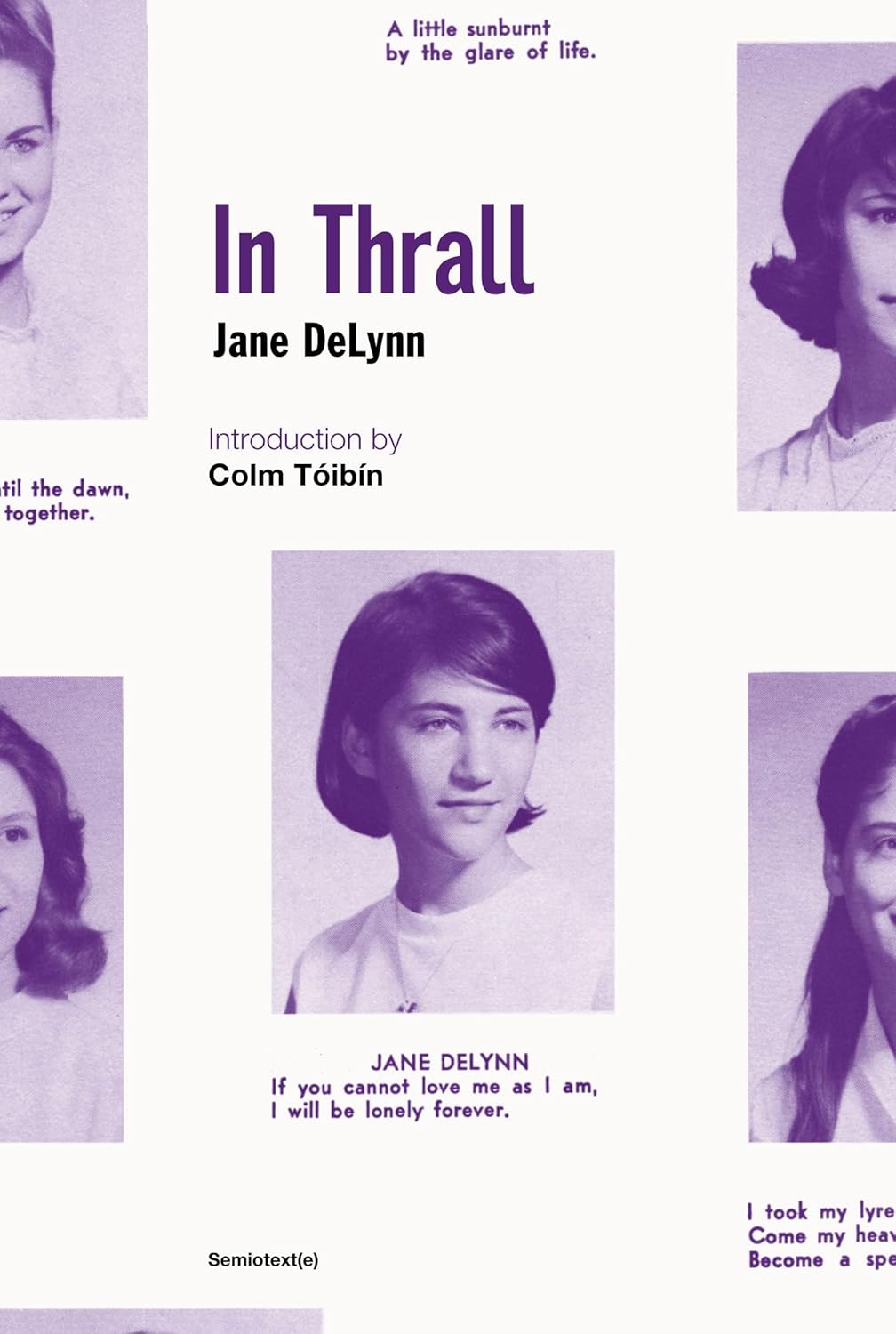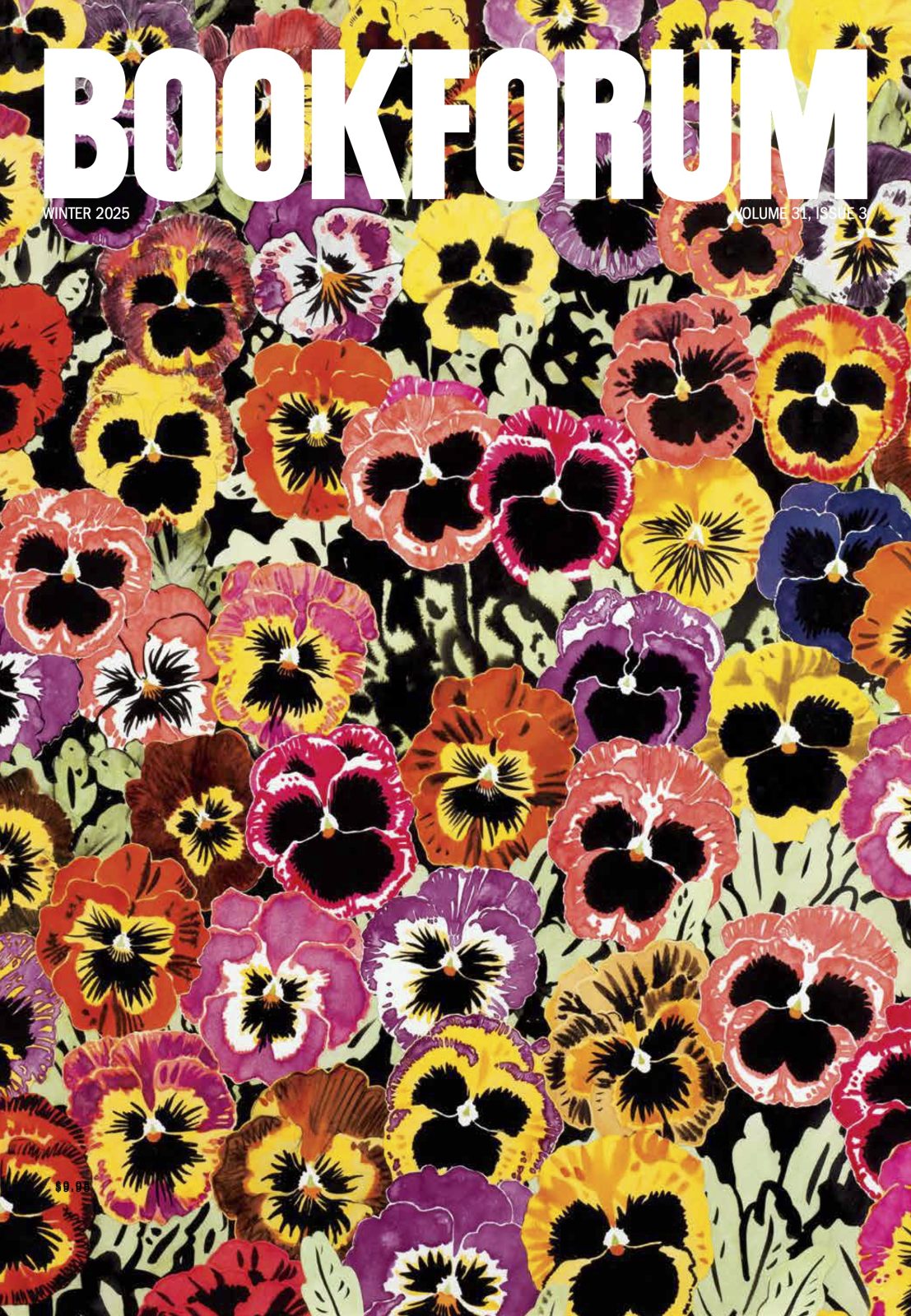
WRITTEN MORE THAN a decade after Stonewall but taking place five years prior to it, Jane DeLynn’s In Thrall is a grimly comic tale of dyke awakening. This 1982 novel, reissued by Semiotext(e), recounts the sexual relationship—at once pitiful, elating, and perverse—between the book’s first-person narrator, Lynn, a sixteen-year-old senior at a selective all-girls high school in New York City, and Miss Maxfeld, her thirty-seven-year-old English teacher. Theirs is not a swoony romance like that enjoyed by the lovers in Patricia Highsmith’s 1952 sapphic touchstone, The Price of Salt: Therese Belivet and Carol Aird, another age-discordant couple who meet in Manhattan (though, crucially, Therese is nineteen, and thirtysomething Carol was never her instructor). The inevitable dissolution of Lynn and Miss Maxfeld’s unseemly affair arrives as a relief to not just the reader but also the characters. Retrospectively assaying a benighted era and bad object choices, DeLynn skillfully maintains a tone that is neither too pessimistic nor too idealistic. Having lived through the time she depicts and the sea change that followed, she writes unsentimentally about a sentimental education—one whose end signals not a dramatic transformation but a shift, however slight, to greater self-knowledge.
In Thrall is the second of DeLynn’s five novels; her last to date, Leash (2002), concerns another unconventional lez coupling, that of Chris, a middle-aged writer (“not famous exactly, but not unknown either”) who is the sub in an increasingly extreme s/m relationship that originated with a personals ad in the Village Voice. The question of how much Chris is modeled on the author is raised by this passage, which could be read as a confession—or a red herring: “Style is my strong point; I lack imagination. I read as I wish to be read, like a fundamentalist reads the Bible, literally, stupidly, convinced that each narrative event, whether recounted in the first or third person, whether plausible or impossible, has been personally experienced by its author.” The same question also hangs over In Thrall. Certain of Lynn’s biographical particulars sync up with those of her creator: both are native New Yorkers and near contemporaries (the writer was born in 1946, Lynn in ’47 or ’48); DeLynn’s own high school yearbook photo graces the cover of the Semiotext(e) reprint, under which this quote appears: “If you cannot love me as I am, I will be lonely forever.”
That self-dramatizing statement could just as easily have been uttered by Lynn. For an assignment in Miss Maxfeld’s class on tragic heroes, she proclaims herself a paragon of the type, writing, “I am a tragic hero because of my tragic flaw—an excess of intelligence that dooms me to unhappiness.” The overweening essay occasions the teacher—who is always referred to as Miss Maxfeld, her first name never disclosed—to ask Lynn to see her in her office after school, a meeting that concludes with an invitation to have tea at the instructor’s apartment later that week. At roughly the midpoint of the novel, after several more of these visits to Miss Maxfeld’s Upper West Side brownstone flat and Lynn’s declaring, in a letter never sent to her teacher, that she is in love with her, the woman kisses her student on the lips. The moment is more ludicrous than lubricious; Lynn notes that Miss Maxfeld, in order to smooch the girl, has to “lift me up so that the heels of my Village Cobbler shoes rose off the floor.” Adding to the absurdity, the buss is followed by the teacher reminding Lynn of a paper due the next day on Wordsworth and Coleridge.
Soon enough, the teenager and the faculty member are “perform[ing] illegal acts in her apartment several afternoons a week.” Lynn sees herself and her female friends (who tease her about her crush on their teacher, but never learn about Lynn’s affair with Miss Maxfeld) as eager participants in the sexual revolution: “this was the first historical event we had been in on since the beginning, and most of us were very excited by it.” And yet sex itself, whether hetero or homo, is not extolled. In a sapphic coming-of-age novel, it comes as no surprise that the fumblings between Lynn and her lacrosse-player boyfriend, Wolf, should be especially dismal (as they seem to be between all of Lynn’s pals and their swains). He’s essentially a beard, whom she keeps seeing even after her romance with her teacher commences “because you have to go out with somebody.” Giving Wolf a hand job, Lynn notes, “All I could think of was Leonard Bernstein, getting hysterical on the podium as he conducted Bruckner’s First Symphony.” (Maybe cheeky DeLynn was thinking of what gay Bernstein did with his hands when he was off the podium.)

Unquestionably, Lynn’s relationship with Miss Maxfeld is presented as a kind of deliverance. Walking home from her teacher’s apartment, the teenager is overcome by emotion: “I would never be happier—not ever—than I was at this moment . . . with . . . all the lights of New York blinking on before my lovesick eyes.” But what she and Miss Maxfeld do in bed together during those clandestine after-school hours is unappealingly described: “I let her put her arms around me, to pull me down once more into the Land of Undifferentiated Slime.” So is Miss Maxfeld. Lynn calls her “an overweight, middle-aged woman,” makes more than one reference to her “mustache,” and is startled by her unplucked eyebrows.
However (temporarily) liberating or transporting the relationship may be, the attraction seems a mystery to them both, and to the reader as well. Miss Maxfeld refers to her beloved as “an infant sociopath,” “a wild animal,” “a brat,” and, repeatedly, “a monster.” Lynn is obnoxious—unprovoked, she gives a guard the finger as she and Miss Maxfeld leave a museum exhibition—and overbearing, always quick to point out to the parents she despises that she is an “intellectual.” Spending three-hundred-plus pages with this know-it-all who knows so little—this baby-dyke Holden Caulfield—is fatiguing. That this is by design does not make Lynn’s company any more enjoyable. Even her lover can’t wait to hustle her out the door. When Lynn floats the possibility of one day living together when she’s out of college, Miss Maxfeld is aghast: “Don’t you think it’s a great relief when I pack you off to your mother, to have a quiet meal by myself or with another grown-up, where I can think about something other than this pathetic, hysterical relationship?”
Shame runs hot in DeLynn’s novel, and her dissection of it provides some of In Thrall’s strongest passages. Ruing the fact that she can’t discuss her affair with anyone, Lynn grows morbid, convinced of her fathomless deviancy: “If I had any guts, I’d jump out the window right now, instead of waiting for the inevitable day when I’d molest some young girl and get arrested, and give my parents the disgrace of watching me sent to prison, where you let the guards finger you for a pack of cigarettes. . . . I was so sick the idea appealed to me. How else would I ever get to have sex with any woman other than Miss Maxfeld?” The wiseacre is tormented by more than her sexuality: Lynn is also ashamed of being Jewish and of her mother’s “horrendous New York accent,” which the teenager has trained herself to get rid of.
Twinned with Lynn’s remorse is her rage, especially after she learns about her older lover’s resigned acceptance of her bleak erotic life. Miss Maxfeld confesses to a scant number of sexual partners (“My ‘whole life,’ Lynn, I think I’ve been with fewer women than the number of boys you manage to date in a year”), to going years without so much as a kiss. To Lynn’s query as to why she doesn’t try to meet someone in a bar, the teacher (the daughter of a rabbi) indignantly responds, “Am I interested in the kind of person who would spend a lot of time in a bar? I don’t like bars, Lynn. I find them boring; I detest the sloppiness of drunks. The Jewish culture is not a bar culture; it’s a culture of books and music.” That priggishness would likely not have gotten Miss Maxfeld many dates at the Sea Colony or any of the other lavender haunts operating in New York City at the time. Instead, her willfully circumscribed world leads her to pursue the most inappropriate companions: she has slept with two other students over the course of her sixteen years as a high school English teacher.
And undoubtedly, Miss Maxfeld will have other pupils as bedmates after Lynn. When, shortly before the girl’s graduation, their relationship is found out—Lynn is betrayed by her cryptically gay cousin, Leonard, who rats her out to her parents—calamity is averted. Wanting to avoid scandal, Lynn’s mother and father decide not to insist on the teacher’s dismissal, only that the relationship end immediately. Neither Lynn nor Miss Maxfeld seems too upset about the breakup. The teacher is already busying herself with writing a commissioned piece “on alternative methods of teaching the poem”; the teenager will be departing in a few months for an (unnamed) Seven Sisters college. DeLynn leaves it up to the reader to imagine her heroine’s future. Who knows how many like-minded sisters she’ll sleep with in the next four years. She’ll graduate in 1968—on the cusp of a revolution and ever more disappointments.
Melissa Anderson is the film editor of 4Columns and the author of a monograph on David Lynch’s Inland Empire from Fireflies Press.
